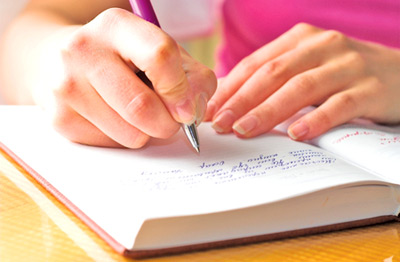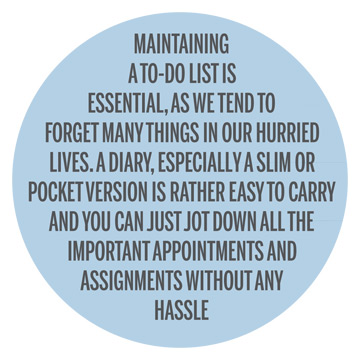 Every year from December to the February of next year, I get inundated with requests for diaries and calendars and I distribute whatever I get. But I always ponder how many of those who make a beeline to my office to get a diary actually maintain one.
Every year from December to the February of next year, I get inundated with requests for diaries and calendars and I distribute whatever I get. But I always ponder how many of those who make a beeline to my office to get a diary actually maintain one.
For a journal that records living history, diaries do have a long history themselves. The Roman Emperor Marcus Aurelius (Second Century AD) is generally believed to have ‘invented’ the concept of a diary with his series of notes to himself, titled Meditations. Much later, the concept became popular in East Asia, especially Japan, where ladies of the Royal Japanese Court wrote day-to-day happenings on their “pillow books”. The best examples of diaries in the modern era, after the invention of printing, come from Samuel Pepys, whose diary recorded the 1666 Great Fire of London in vivid detail and Anne Frank, whose diary on the Second World War recounted the horrors of a conflict that engulfed the entire globe.
A time capsule
 A diary can serve several purposes. For most people, it is little more than a “to-do list” of things to do and appointments to keep. But a few others (this is a minority I believe in this smartphone age), painstakingly record the events that shape their lives on a given day in their diary, in which case it can also be called a journal. Once that particular year passes, the diary becomes a time capsule, one that can be read even decades later. Some, like those of Pepys and Frank, can even cease to become private objects as the whole world gets to read one’s place in history.
A diary can serve several purposes. For most people, it is little more than a “to-do list” of things to do and appointments to keep. But a few others (this is a minority I believe in this smartphone age), painstakingly record the events that shape their lives on a given day in their diary, in which case it can also be called a journal. Once that particular year passes, the diary becomes a time capsule, one that can be read even decades later. Some, like those of Pepys and Frank, can even cease to become private objects as the whole world gets to read one’s place in history.
 Maintaining a to-do list is essential, as we tend to forget many things in our hurried lives. A diary, especially a slim or pocket version is rather easy to carry and you can just jot down all the important appointments and assignments without any hassle. Then you can tick them off one by one. You can also amend the entries as you go, as there will be cancellations and postponements too. Some diaries come pre—equipped with a pen and a calculator, so that you can also do your financial calculations (supermarket expenses, bank balances etc) and make the relevant entries in your diary on the move. If you have still not got around to maintaining a to-do list, now is the time to begin one.
Maintaining a to-do list is essential, as we tend to forget many things in our hurried lives. A diary, especially a slim or pocket version is rather easy to carry and you can just jot down all the important appointments and assignments without any hassle. Then you can tick them off one by one. You can also amend the entries as you go, as there will be cancellations and postponements too. Some diaries come pre—equipped with a pen and a calculator, so that you can also do your financial calculations (supermarket expenses, bank balances etc) and make the relevant entries in your diary on the move. If you have still not got around to maintaining a to-do list, now is the time to begin one.
Recording key events
But the biggest appeal of a diary stems from its other role as a journal. This is where you can write down your thoughts on the day’s events from your perspective.
It can be something that appeals only to you and your family members such as your birthday or it can be something that affects the wider world such as the war in Ukraine. Did you make an entry in your diary on February 24, 2022, as the Russian tanks rolled into Ukraine? Many decades later, maybe even long after you are gone, that entry could be read eagerly by your grandchildren and their children. They will be able to re-live history through your eyes.
But wait. Do you even need a paper diary at all in this age of the smartphone and the tablet? For me, no smartphone can truly replace a paper diary, which is a tangible, almost living, thing. Putting pen to paper is still an experience that cannot be matched by inputting keystrokes into your smartphone. Besides, a paper diary will never run out of batteries, cost next to nothing if lost or stolen (apart from the sentimental value, perhaps) and remain a (physical) part of your life till you bid adieu.
‘Writing on the screens’
On the other hand, I do appreciate the convenience of an electronic diary. Actually, before smartphones came to the scene, there were so-called Personal Digital Assistants (PDAs) from brands such as Palm which were glorified electronic diaries.
They never really caught on in a big way, but all their functions have since been ported over to smartphones and tablets such as the iPad. You can even “write” on the screens of some tablets and smartphones with a stylus, giving it the same look and feel as a conventional paper diary. Besides, you do not have to carry an extra paper diary around.
There is another advantage of using an electronic diary – the alarm. You can set it to sound say, one hour before your next appointment. This way, you will never miss an appointment or a task. With a conventional diary, there is always the possibility of “forgetting” an appointment or even leaving it behind at home. There are also countless other things that a conventional diary can never do – such as organising an impromptu video conference or storing your data on the cloud.
E- Journals
There are also many smartphone apps that mimic the look and feel of a real paper diary, but it is somewhat difficult to use the on-screen keyboard to make long entries. And no one I know maintains a diary on a laptop, where it is much easier to type on. Perhaps a tablet or phablet (those devices which straddle the divide between the smartphones and the big tablets) would be a better bet if you are keen on maintaining an electronic journal.
The biggest advantage of using a diary – conventional or electronic – is that it helps to organise your life amidst this rat race. Most people say they have no time to do this or that, but with a diary, which will probably have defined slots for all tasks, “time management” becomes a breeze. Maintaining a diary can help you to become a more punctual person who respects time, whether it is yours or others’.
And it can help you relax at the end of the day, especially if you take the time to reflect on and write on the day’s events. The year is still young – if you do not have a diary yet, get one or install a suitable app on your smartphone. It is one New Year resolution that you can repeat year after year.
